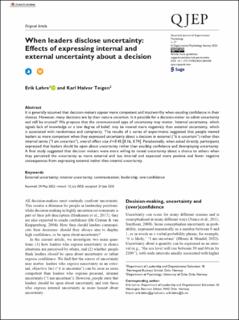| dc.contributor.author | Løhre, Erik | |
| dc.contributor.author | Teigen, Karl Halvor | |
| dc.date.accessioned | 2023-12-18T14:04:15Z | |
| dc.date.available | 2023-12-18T14:04:15Z | |
| dc.date.created | 2023-10-17T13:10:41Z | |
| dc.date.issued | 2023 | |
| dc.identifier.issn | 1747-0218 | |
| dc.identifier.uri | https://hdl.handle.net/11250/3108053 | |
| dc.description.abstract | It is generally assumed that decision-makers appear more competent and trustworthy when exuding confidence in their choices. However, many decisions are by their nature uncertain. Is it possible for a decision-maker to admit uncertainty and still be trusted? We propose that the communicated type of uncertainty may matter. Internal uncertainty, which signals lack of knowledge or a low degree of belief, may be viewed more negatively than external uncertainty, which is associated with randomness and complexity. The results of a series of experiments suggested that people viewed leaders as more competent when they expressed uncertainty about a decision in external (“It is uncertain”) rather than internal terms (“I am uncertain”), overall effect size d = 0.45 [0.16, 0.74]. Paradoxically, when asked directly, participants expressed that leaders should be open about uncertainty rather than exuding confidence and downplaying uncertainty. A final study suggested that decision makers were more willing to reveal uncertainty about a choice to others when they perceived the uncertainty as more external and less internal and expected more positive and fewer negative consequences from expressing external rather than internal uncertainty. | en_US |
| dc.language.iso | eng | en_US |
| dc.publisher | Sage | en_US |
| dc.rights | Navngivelse 4.0 Internasjonal | * |
| dc.rights.uri | http://creativecommons.org/licenses/by/4.0/deed.no | * |
| dc.title | When leaders disclose uncertainty: Effects of expressing internal and external uncertainty about a decision | en_US |
| dc.title.alternative | When leaders disclose uncertainty: Effects of expressing internal and external uncertainty about a decision | en_US |
| dc.type | Journal article | en_US |
| dc.type | Peer reviewed | en_US |
| dc.description.version | publishedVersion | en_US |
| dc.source.journal | Quarterly Journal of Experimental Psychology (QJEP) | en_US |
| dc.identifier.doi | 10.1177/17470218231204350 | |
| dc.identifier.cristin | 2185561 | |
| cristin.ispublished | true | |
| cristin.fulltext | original | |
| cristin.qualitycode | 1 | |

